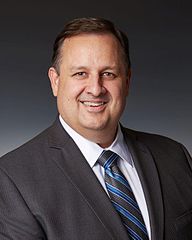July 6, 2017 •
Director of US Ethics Office Resigns
Today, Director Walter Shaub Jr. submitted his resignation from the U.S. Office of Government Ethics (OGE). Shaub, in his position at the OGE, has repeatedly questioned various possible conflicts of interests of President Trump and of members of the president’s […]
 Today, Director Walter Shaub Jr. submitted his resignation from the U.S. Office of Government Ethics (OGE). Shaub, in his position at the OGE, has repeatedly questioned various possible conflicts of interests of President Trump and of members of the president’s White House staff.
Today, Director Walter Shaub Jr. submitted his resignation from the U.S. Office of Government Ethics (OGE). Shaub, in his position at the OGE, has repeatedly questioned various possible conflicts of interests of President Trump and of members of the president’s White House staff.
Shaub will leave his position on July 19 and begin working at the Campaign Legal Center, a nonpartisan organization of election-law experts based in Washington, D.C. “At the Campaign Legal Center, I’ll have more freedom to push for reform. I’ll also be broadening my focus to include ethics issues at all levels of government,” Shaub told NPR.
Federal contractors may be required to provide “paid leave to employees who are sick, are seeking medical attention or need to care for a sick relative,” according to an article published in today’s New York Times. The paper says it […]
 Federal contractors may be required to provide “paid leave to employees who are sick, are seeking medical attention or need to care for a sick relative,” according to an article published in today’s New York Times.
Federal contractors may be required to provide “paid leave to employees who are sick, are seeking medical attention or need to care for a sick relative,” according to an article published in today’s New York Times.
The paper says it obtained a confidential draft of a presidential executive order, marked “pre-decisional and deliberative,” requiring all federal contractors and subcontractors to provide leave for illnesses and for care of “a child, parent, spouse, domestic partner ‘or any other individual related by blood or affinity whose close association with the employee is the equivalent of a family relationship.’” The White House has refused to comment on the draft document.
April 9, 2012 •
Lobbying and Campaign Finance News
Keep up with the latest lobbying and campaign finance news:
 “White House abandons push for federal contractors to disclose political giving” by Mike Lillis in The Hill.
“White House abandons push for federal contractors to disclose political giving” by Mike Lillis in The Hill.
“F.C.C. Pushes for Web Site on TV Political Ad Spending” by Brian Stelter in The New York Times.
“Limits on Lobbyists as Hosts? Simply Unworkable, They Say” by Robert Pear in The New York Times.
“FEC Ruling Leaves Ad Uncertainty” by Eliza Newlin Carney in Roll Call.
Arkansas: “Campaign Finance Reform in Arkansas Enters a New Phase” by KARK 4 News.
Maryland: “Lobbyist scores a ‘scoop’ of sorts” by Michael Dresser in The Baltimore Sun.
July 28, 2011 •
The White House Now Holding Office Hours on Twitter
Another Opportunity to Interact with the White House Through Social Media
 Twitter “Office Hours” is the newest addition to the White House’s recent utilization of social media in order to connect to the public.
Twitter “Office Hours” is the newest addition to the White House’s recent utilization of social media in order to connect to the public.
Similar to President Obama’s Twitter town hall, participants can ask a question by including the hashtag #WHChat with their tweets. Replies to questions will come from the @whitehouse Twitter account.
The first of 6 planned sessions was Tuesday, July 26 at 5 PM EDT. After each session, the White House will post a “transcript” of the chat on its blog.
As could be expected, most questions asked were relating to the budget and raising the debt ceiling.
Read the full article titled “White House staff holds Twitter ‘Office Hours’” on NextGov.com.
February 4, 2011 •
Highlighted Site of the Week – The State of The Union at Whitehouse.gov
SOTU meets Gov 2.0.
 President Barack Obama delivered his 2011 State of the Union Address to a joint session of Congress on January 25. If you missed it, it’s not a problem, you can watch an archived video on the White House website. What you may have missed is the “Gov 2.0 style” conversation that surrounded the event.
President Barack Obama delivered his 2011 State of the Union Address to a joint session of Congress on January 25. If you missed it, it’s not a problem, you can watch an archived video on the White House website. What you may have missed is the “Gov 2.0 style” conversation that surrounded the event.
Gov 2.0 is a term that gets thrown around a great deal to describe the new way government and citizenry can interact through technology. I think the State of the Union Address 2011 is a dramatic example of how far social media has changed the way government operates.

All we have from George Washington’s first State of the Union Address is his manuscript and that is pretty much it – precious as it is.
For the State of the Union 2011, Whitehouse.gov provided live video online (now archived) of the speech, a transcript of the text, and a photo gallery. You can also download it on iTunes.
But it was what happened after the event that we see where Gov 2.0 really came into play. The White House provided the chance for an exchange with the American people. According to Whitehouse.gov: “In the days following the State of the Union Address, President Obama and senior Administration officials held a series of live online events to answer your questions.” Through social media, the White House took in questions from the public and then answered (some of) them.
On the Whitehouse.gov SOTU site you can see a video of President Obama responding to questions. You can see Vice President Joe Biden fielding questions on Yahoo. There are videos of what was a series of live online roundtables with White House policy experts in the areas of the economy, education, foreign policy, and healthcare. Live from the White House, senior White House officials also answered questions about issues covered in the speech and you can see it on YouTube.
From the website, you can receive email updates regarding the State of the Union address or follow the White House on Twitter and Facebook. Connectivity, it’s all about connectivity.
 If you want more, there is plenty out there. One of the coolest websites – stateoftheunion.onetwothree.net has an interactive word cloud that allows you to see exactly how many times a word is used in all of the State of the Union Addresses by all of the presidents. The admirable American Presidency Project offers an easily navigable source of transcripts from every State of the Union Address since George Washington’s first.
If you want more, there is plenty out there. One of the coolest websites – stateoftheunion.onetwothree.net has an interactive word cloud that allows you to see exactly how many times a word is used in all of the State of the Union Addresses by all of the presidents. The admirable American Presidency Project offers an easily navigable source of transcripts from every State of the Union Address since George Washington’s first.
That ought to keep you busy. Have a great weekend!
State and Federal Communications, Inc. provides research and consulting services for government relations professionals on lobbying laws, procurement lobbying laws, political contribution laws in the United States and Canada. Learn more by visiting stateandfed.com.

